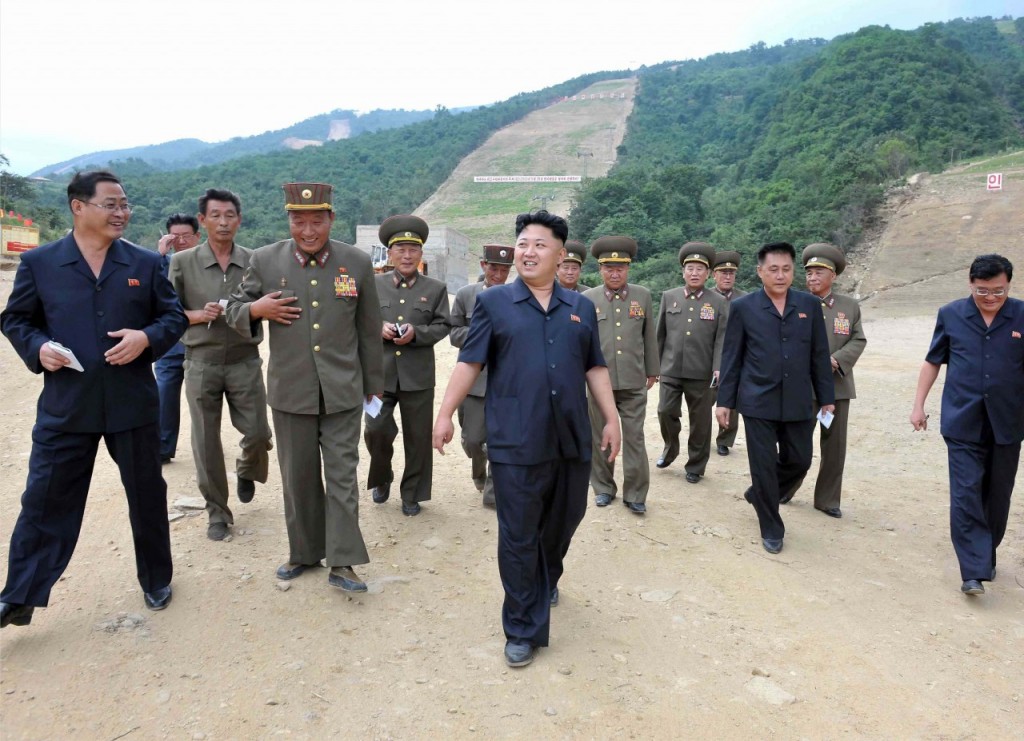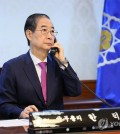- California Assembly OKs highest minimum wage in nation
- S. Korea unveils first graphic cigarette warnings
- US joins with South Korea, Japan in bid to deter North Korea
- LPGA golfer Chun In-gee finally back in action
- S. Korea won’t be top seed in final World Cup qualification round
- US men’s soccer misses 2nd straight Olympics
- US back on track in qualifying with 4-0 win over Guatemala
- High-intensity workout injuries spawn cottage industry
- CDC expands range of Zika mosquitoes into parts of Northeast
- Who knew? ‘The Walking Dead’ is helping families connect
US puts N. Korea among world’s worst countries for human trafficking

North Korea’s leader Kim Jong-un visits the construction site of a ski resort being built on Masik Pass. (KCNA/Yonhap)
WASHINGTON, July 27 (Yonhap) — The United States designated North Korea as one of the world’s worst countries for human trafficking for the 13th straight year on Monday, saying Pyongyang fails to meet even the minimum standards for efforts to improve the situation.
The State Department’s annual “Trafficking in Persons Report” put North Korea in the lowest Tier 3 of its four-step classification of countries, saying the communist regime maintains political prison camps and sends people overseas for forced labor.
“The government of North Korea does not fully comply with the minimum standards for the elimination of trafficking and is not making significant efforts to do so,” the report said. “The government did not demonstrate any efforts to address human trafficking through prosecution, protection or prevention measures.”
Other Tier 3 countries include Iran, Libya, Syria, Russia, Zimbabwe and Thailand.
The report called the North “a source country for men, women, and children who are subjected to forced labor and sex trafficking,” saying forced labor is part of an established system of political repression.
“The government subjects its nationals to forced labor in prison camps in North Korea and through government-contracted labor in foreign countries,” the report said. “North Korea holds an estimated 80,000 to 120,000 prisoners in prison camps in remote areas of the country.”
In many cases, these prisoners have not been prosecuted, convicted, or sentenced in a judicial proceeding, and in prison camps, all prisoners, including children, are subject to forced labor, including logging, mining, or farming for long hours under harsh conditions, the report said.
“Prisoners are subjected to unhygienic living conditions, beatings, a lack of medical care, and insufficient food; many do not survive. Furnaces and mass graves are used to dispose of the bodies of those who die in these camps,” it said.
The North is also believed to have about 50,000 or higher numbers of laborers working abroad “under conditions indicative of forced labor, such as working excessively long hours in hazardous temperature with no pay for up to three years.”
“They face threats of government reprisals against them or their relatives in North Korea if they attempt to escape or complain to outside parties. Reports show up to 90 percent of workers’ salaries are appropriated and controlled by the North Korean government,” the report said.
The report also noted that many North Korean women and girls, who have fled to neighboring China, are “especially vulnerable to trafficking,” saying traffickers reportedly lure, drug, detain, or kidnap some North Korean women upon their arrival.
“According to one report, some women in the North Korean defector population are subjected to sexual slavery to Chinese or Korean-Chinese men, forced into prostitution in brothels or through Internet sex sites, or compelled to serve as hostesses in nightclubs or karaoke bars,” the report said.
“If found by Chinese authorities, victims are forcibly repatriated to North Korea where they are subjected to harsh punishment, possibly including forced labor in labor camps or the death penalty,” it added.
Meanwhile, the report put South Korea among Tier 1 countries, along with other advanced countries like the U.S., Britain, France and Germany.
Still, the report noted that some South Korean women, who owe debts to entertainment establishment owners or loan sharks, are forced into prostitution while some disabled or intellectually disabled Korean men are forced to work on salt farms, where they experience verbal and physical abuse, nonpayment of wages and other abuses.















